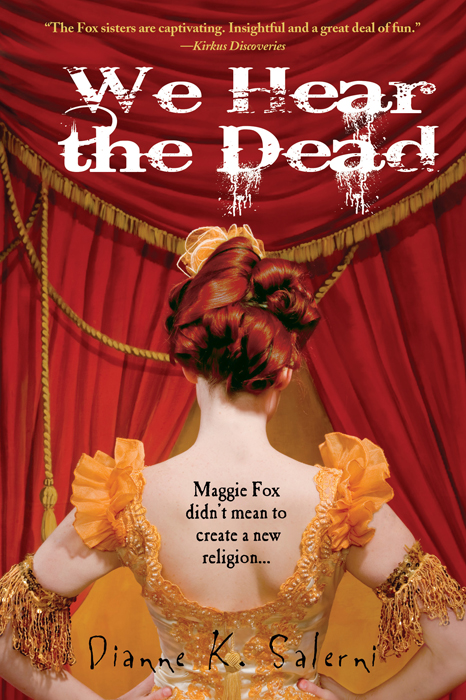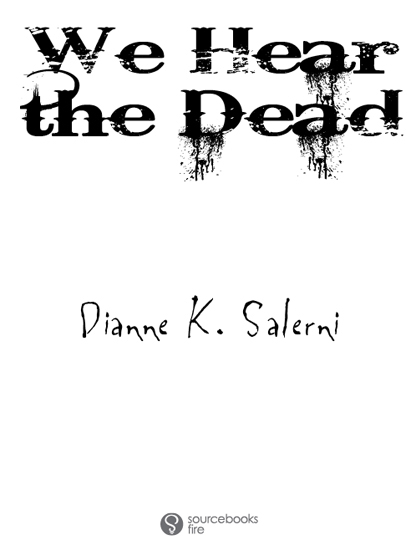We Hear the Dead
Authors: Dianne K. Salerni



Copyright © 2007, 2010 by Dianne K. Salerni
Cover and internal design © 2010 by Sourcebooks, Inc.
Cover design by Marci Senders
Cover image © Big Cheese Photo/Jupiter Images
Sourcebooks and the colophon are registered trademarks of Sourcebooks, Inc.
All rights reserved. No part of this book may be reproduced in any form or by any electronic or mechanical means, including information storage and retrieval systemsâexcept in the case of brief quotations embodied in critical articles or reviewsâwithout permission in writing from its publisher, Sourcebooks, Inc.
The characters and events portrayed in this book are fictitious and used fictitiously. Apart from well-known historical figures, any similarity to real persons, living or dead, is purely coincidental and not intended by the author.
Published by Sourcebooks Fire, an imprint of Sourcebooks, Inc.
P.O. Box 4410, Naperville, Illinois 60567-4410
(630) 961-3900
Fax: (630) 961-2168
teenfire.sourcebooks.com
Library of Congress Cataloging-in-Publication data is on file with the publisher.
who believed in me
This is a work of historical fiction, although the story of Maggie Fox is a true one. I have fictionalized the narrative, using my own interpretation of documented events. Some of the dialogue is taken from correspondence and published writing of the time. On occasion, I have changed the sequence of events to fit the story line and have altered details of place or circumstance.
I began the deception when I was too young to know right from wrong. No one suspected us of any trick, because we were such young children. We were led on by my sister purposely and by my mother unintentionally.
Only with the passing of time did I come to understand the consequences of my actions. As Doctor wrote to me: “Weary! weary is the life by cold deceit oppressed.”
My sister has used the word “deception.” I object to her use of that word, for I do not believe that I have ever intentionally deceived anyone.
Maggie has a different understanding of all the events that have happened since that night in Hydesville long ago. To her the spirits were always a game. For my sister Leah they were a means to an end. For my mother, a miracle.
And for me they were my life's calling. I have no regrets.
THE HAUNTING OF HYDESVILLE
Maggie
My earliest memories always include Kate. With three years between us, there must have been a time when she was a toddling child in infant's clothes and I an independent youngster, but I do not remember this. As long as I can remember, we were together, friends and sisters, inseparable companions. Later we would come to be known as the Fox sisters, named by the newspapers as a single entity. We grew up together and yet alone, separated from our older siblings by more than fourteen years and allowed to run wild and free by parents astonished to have produced a second batch of offspring.
We were a mischievous pair, playing tricks on each other, on the neighbor children, and on our parents. Household objects such as my father's spectacles and my mother's hairbrush were always going astray. Kate usually discovered the missing objects and was praised for her cleverness. Feeling a bit jealous, I once asked Kate peevishly if the next time she stole some object, she couldn't let me be the one to find it. She stared at me silently for a moment, her violet eyes steady upon me, and then replied, “Just because I find them doesn't mean I stole them.”
A fine thing to say to her companion in devilment! I tied the string to the apple with my own hands when her six-year-old fingers were too clumsy to secure the knots. We used to drop the apple out of bed and let it thump on the floor, then draw it quickly back into bed when my mother tried to find the source of the noise. This was a great game, and after several repetitions my mother would mutter superstitiously about spirits and devils. Kate always wanted to push the boundaries of common sense, dropping the apple when our mother was close enough to see.
“We shall be caught,” I whispered nervously.
“No, we shan't,” she murmured back.
And we never were. My mother never could see anything but good in us. I believe she must have used up the sharpest of her mothering instincts on my siblings, and by the time we came to her, she was weary.
My mother's life had not been an easy one. In my father's younger years, he had battled a drinking problem, and my mother left him for a time. She moved with her two children, Leah and David, into her sister Catherine's home. Although these events took place long before I was born, I have had ample opportunity to hear Leah talk about her life without a father and the hardships she endured. I know it was partly to escape poverty that Leah ran away and married Bowman Fish when she was only fourteen years oldânot that it did her any good.
Eventually my father's reformation and conversion to Methodism resulted in reconciliation with Mother and an attempt to make a living on a farm in Ontario. By the time I was born, David was approaching adulthood and Leah had already presented my parents with a grandchild. Kate's arrival, three years after me, surprised them even more. Sometimes my father would squint at us through his spectacles as if he were a little confused about who we were and how we came to be living in his house.
Kate and I spent our earliest childhood years living on the farm, and when that venture failed, my father moved us to Rochester, New York. We spent some years there, with my father now trying to make a living as a blacksmith. David eventually married and moved to Wayne County, near the town of Hydesville. He spoke to my father about a tract of land near his farm, and in the early part of 1848 my father decided to build a house there.
***
I was not happy about leaving the cheerful and bustling city of Rochester for the dreary, vacant countryside of Wayne County. I had just turned fourteen, and I thought that being banished to “frontiersland” would be the end of my life.
To make matters worse, the rooms that my family rented in Rochester had become unavailable because the owner, Mr. Isaac Post, had sold the house. It was necessary to move out of our lodgings before the new home was built, so my father rented a small house within the town limits of Hydesville.
Hydesville wasn't much of a town, as far as I was concerned, and ours wasn't much of a house. Its best feature was a south-facing parlor with several windows to brighten the room. The kitchen, however, was dark and dreary. The house's single bedroom received sunlight only in the morning. There was a buttery off the kitchen, and a cobwebbed attic over the back half of the house. The absolutely most horrible part of the house was the cellar.
Kate and I explored it while Father and David moved furniture above us. Foul water squelched around our shoes, bubbling up from the damp earth floor. The wood beams supporting earthen walls leaned inward at an alarming angle, giving the unsettling impression of imminent collapse.
“It smells like an open grave,” I stated in disgust.
“To be sure,” answered Kate, “and there lies the corpse.” She pointed at the darkest corner of the cellar, where I could dimly make out a mound of loose earth piled carelessly against a crooked wall.
“What are you girls doing down there?”
The voice made us jump. We turned and saw my father leaning in through the doorway, peering at us in the dim light.
I opened my mouth, ready to burst out with fresh complaints about moving into a house built over a pauper's cemetery. But Kate took my hand firmly and spoke before me. “We were just curious, Father.” She led me toward the stairs, and I followed silently, without voicing my opinion.
Hydesville was less a town than a cluster of houses and farms that had grown up around a tavern, which later closed down and left the townsfolk wondering why they had come. My mother, I know, was relieved to see the boarded doors on the old Hyde's Tavern. She had forgiven her husband for his years of drunkenness but had never quite forgotten.
We had lived in the Hydesville house less than two weeks when a letter from my sister Leah arrived, telling us to expect her daughter to arrive by canal boat within a few days. Lizzie was coming “to lend us a hand.” Only Leah could imagine that feeding and housing another person under our present circumstances would be a help. Especially Lizzie, a great big horse of a girl with the brains of a cow and the liveliness of a fence post.
Leah obviously needed to be rid of Lizzie for her own purposes. Perhaps she wanted to put a boarder in the girl's room to make extra money. Leah held piano lessons and rented rooms but always seemed to be in an endless state of acquiring funds. Whenever she could persuade my parents to feed, clothe, and shelter her daughter, she did so.
Anticipating Lizzie's arrival did not improve my outlook on the house, Hydesville, or the dismal end of my former life. Kate and I moaned and threw fits, but Lizzie was already on her way, and our mother actually looked forward to her arrival. Honestly, I cannot tell why, unless it was simply because she was the eldest grandchild and the daughter of her precious Leah. Lizzie did not resemble my sister, who was pretty and bold and the center of any gathering of people. I never met Mr. Bowman Fish, who ran off to marry a rich widow when Lizzie was only a baby, but I imagine that he must have resembled his own name and passed those features on to his daughter.
“Lizzie Fish is a stinky old cod,” Kate chanted out of the hearing of our parents.
“Face like a path where the oxen trod,” I rejoined, turning the jump rope, which we had tied to a tree.
“Screwed up little eyes and pale, thin hairâ”
“For a penny and a half I would push her down the stair.”
“How many steps did Lizzie fall down?”
“Oneâ¦twoâ¦threeâ¦fourâ¦fiveâ¦six⦔
My seventeen-year-old niece, Lizzie, was the least important person in this entire storyâand also the most important. She was the reason for everything that was to come: the rapping, the lecture halls, the spirit circles, and the messages from the dead.
Kate and I did not like Lizzie. We did not look forward to her arrival, and we resented sharing our bed with her.
Everything that happenedâeverythingâwas originally just a plan to scare Lizzie and make her go home.